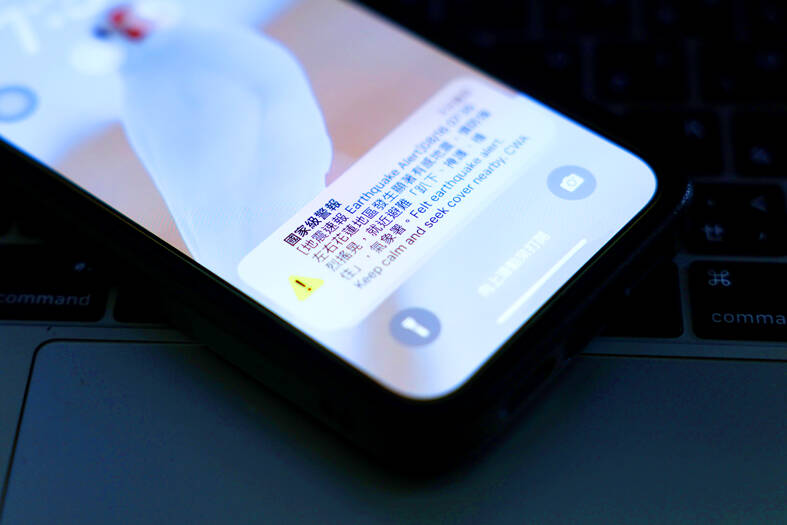Presidential earthquake alerts from tomorrow are to include areas experiencing an estimated intensity of 3 or higher, down from an intensity of 4, for quakes measuring 6.5 or higher on the Richter scale, the Central Weather Administration (CWA) said yesterday.
The Public Warning System currently sends alert messages to people whose locations are anticipated to be affected by earthquakes with a magnitude of 5 or higher, and an intensity of at least 4, the agency told a news conference.
To allow for two to three more seconds for people to take cover, the system would also issue presidential alerts for areas that could experience an intensity of 3 or higher during a magnitude 6.5 or higher quake, it said.

Photo: CNA
CWA Seismological Center Director Wu Chien-fu (吳健富) said the agency decided to lower the threshold for triggering a presidential alert in the wake of the Hualien earthquake on April 3, which measured 7.2 on the Richter scale.
Some earthquakes of lower magnitude have long duration and strong low-frequency waves, he said, adding that the effect of such temblors is more noticeable in high-rise buildings.
For example, if the intensity measured on the first floor is level 3, then it would be level 4 when seismic waves are transmitted to the ninth floor, Wu said.
Meanwhile, the Hualien earthquake indicated that the system’s initial forecast tended to underestimate severity, so quakes with a magnitude of 6.5 or higher are included to allow for more response time, he said, adding that quakes of this level are usually followed by aftershocks.
Although some people have found presidential alert messages “annoying,” the frequency should be reasonable and tolerable, Wu said.
There have been eight earthquakes of magnitude 6.5 or higher since 2022, he said, adding that based on this frequency, only 1.4 more alerts would be issued on average in the same period under the new scheme.
People in northern Taiwan might be alerted more frequently due to site effects, in which seismic waves are amplified by changing geological conditions, Wu added.
He cited Taipei as an example, where the Hualien earthquake reached the greatest intensity 16 to 17 seconds after it occurred, saying that the alert messages could have been issued two to three seconds earlier if the system had been triggered by quakes with an intensity of as low as 3.
The CWA uses cell broadcast technology to send alert messages via the system within seconds after an earthquake happens, he said, adding that the response time is crucial for people to escape from objects that would fall or pull over their car if they are driving.

US climber Alex Honnold is to attempt to scale Taipei 101 without a rope and harness in a live Netflix special on Jan. 24, the streaming platform announced on Wednesday. Accounting for the time difference, the two-hour broadcast of Honnold’s climb, called Skyscraper Live, is to air on Jan. 23 in the US, Netflix said in a statement. Honnold, 40, was the first person ever to free solo climb the 900m El Capitan rock formation in Yosemite National Park — a feat that was recorded and later made into the 2018 documentary film Free Solo. Netflix previewed Skyscraper Live in October, after videos

NUMBERS IMBALANCE: More than 4 million Taiwanese have visited China this year, while only about half a million Chinese have visited here Beijing has yet to respond to Taiwan’s requests for negotiation over matters related to the recovery of cross-strait tourism, the Tourism Administration said yesterday. Taiwan’s tourism authority issued the statement after Chinese-language daily the China Times reported yesterday that the government’s policy of banning group tours to China does not stop Taiwanese from visiting the country. As of October, more than 4.2 million had traveled to China this year, exceeding last year. Beijing estimated the number of Taiwanese tourists in China could reach 4.5 million this year. By contrast, only 500,000 Chinese tourists are expected in Taiwan, the report said. The report

Temperatures are forecast to drop steadily as a continental cold air mass moves across Taiwan, with some areas also likely to see heavy rainfall, the Central Weather Administration (CWA) said. From today through early tomorrow, a cold air mass would keep temperatures low across central and northern Taiwan, and the eastern half of Taiwan proper, with isolated brief showers forecast along Keelung’s north coast, Taipei and New Taipei City’s mountainous areas and eastern Taiwan, it said. Lows of 11°C to 15°C are forecast in central and northern Taiwan, Yilan County, and the outlying Kinmen and Lienchiang (Matsu) counties, and 14°C to 17°C

STEERING FAILURE: The first boat of its class is experiencing teething issues as it readies for acceptance by the navy, according to a recent story about rudder failure The Hai Kun (海鯤), the nation’s first locally built submarine, allegedly suffered a total failure of stern hydraulic systems during the second round of sea acceptance trials on June 26, and sailors were forced to manually operate the X-rudder to turn the submarine and return to port, news Web site Mirror Daily reported yesterday. The report said that tugboats following the Hai Kun assisted the submarine in avoiding collisions with other ships due to the X-rudder malfunctioning. At the time of the report, the submarine had completed its trials and was scheduled to begin diving and surfacing tests in shallow areas. The X-rudder,